‘Russiagate’ impeachment push reveals U.S. indifference to corruption and war crimes
Just a couple weeks past the symbolic 100-day marker of the Trump presidency, prominent Democrats are increasingly urging the president’s impeachment for alleged improprieties related to the so-called “Russiagate” controversy. More than two dozen Democratic members of congress — and a couple Republicans — have already alluded to the possibility of initiating impeachment proceedings, and following Donald Trump’s recent firing of FBI Director James Comey, those calls are intensifying.
Democratic Rep. Al Green of Texas last week became the first congressman to call for Trump’s impeachment from the floor of the House of Representatives.
“I rise today with a heavy heart,” Green said in a dramatic speech. “I rise today with a sense of responsibility and duty to the people who have elected me, a sense of duty to this country, a sense of duty to the Constitution of the United States of America. I rise today, Mr. Speaker, to call for the impeachment of the President of the United States of America for obstruction of justice.”
The congressman went on to describe the reasons he feels impeachment is necessary. Stating that “our democracy is at risk,” Green explained that when President Trump “fired the FBI director who was investigating the President for his connections to Russian involvement in the President’s election,” the president unlawfully obstructed justice into a federal investigation.
For the sake of the rule of law, the congressman stated that Congress must initiate impeachment proceedings to ensure the principle of no one being above the law is upheld. His calls have been echoed by senators and congressmen speaking out on television talk shows and Twitter, indicating a growing trend in Washington toward the real possibility of removing this president less than a year into his first term.
There are two things noteworthy about these developments. One is that the very basis for the impeachment calls rests on a number of assumptions that may very well lack any basis in fact. For all of the talk about Trump’s alleged “collusion” with the Russian government, what is left unsaid is that the “collusion” allegations relate to a fundamentally unproven assertion – that the Russian government actually interfered in Election 2016 as part of a plot to ensure that Trump defeated Hillary Clinton in the Nov. 8 presidential election.
This alleged “interference” amounted to a supposed clandestine plot to hack the Democratic National Committee’s emails and provide the contents to WikiLeaks in order to make Clinton look bad and expose the DNC’s unfair handicapping of the insurgent Bernie Sanders campaign during the Democratic primary elections. In other words, Russia allegedly “meddled” in the election by helping to expose how corrupt the U.S. electoral system is. (It should be noted that the veracity of the emails’ contents is not disputed.)
Although this conspiracy theory has been endlessly promoted in the U.S. media and is essentially accepted as a self-evident truth by Democratic partisans, it should not be forgotten that it lacks any proof whatsoever and that there are a number of alternative possibilities for how WikiLeaks obtained the incriminating emails from the DNC.
One such theory is that they were provided by former DNC staffer Seth Rich, who was mysteriously murdered in a so-called “botched robbery” on the streets of Washington, DC, on July 10, 2016. This is the possibility that WikiLeaks’ Julian Assange alluded to when he offered a $20,000 reward for information leading to a conviction in Rich’s killing.
Although WikiLeaks has a strict policy of not naming its sources, the reward for information about the Rich murder coupled with the fact that Assange has unequivocally stated that Russia was not the source of the leaks should raise at least a few doubts about the “official conspiracy theory,” i.e. the theory promoted by mainstream media, the U.S. intelligence community and the Democratic Party that Russia – in collusion with the Trump campaign – somehow “meddled” in the election.
(For his part, Russian President Vladimir Putin has also unequivocally denied being the source of the DNC email leaks. “Read my lips – no,” he said when asked whether Russia had interfered in the U.S. election.)
It should also be noted that the closest thing to evidence to back up this official conspiracy theory amounts to a series of unproven assertions put forward by the U.S. intelligence community, which it should be recalled, has been known to tell a lie or two on occasion. In an “analytic assessment” published Jan. 6, the Director of National Intelligence concluded that the Kremlin had hacked the DNC emails in an effort to undermine Clinton’s campaign.
The official report however offers nothing approaching hard evidence of allegation of Russian interference, which Sen. John McCain (R-Ariz.) and others have called an “act of war.” Indeed, the report states upfront that its sources and methods for reaching its conclusions remain “highly classified,” noting that “the Intelligence Community rarely can publicly reveal the full extent of its knowledge or the precise bases for its assessments, as the release of such information would reveal sensitive sources or methods and imperil the ability to collect critical foreign intelligence in the future.”
So, instead of offering proof, the report “covers the motivation and scope of Moscow’s intentions regarding US elections and Moscow’s use of cyber tools and media campaigns to influence US public opinion.” In other words, the intelligence community is offering its guesses as to why Moscow may have been motivated to engage in an “act of war” against the U.S. government without sharing a shred of proof that it actually did.
As former CIA analyst Ray McGovern describes it in a recent article,
The oft-cited, but evidence-free, CIA/FBI/NSA report of Jan. 6 – crafted by selected senior analysts, according to then-Director of National Intelligence James Clapper – is of a piece with the “high-confidence,” but fraudulent, National Intelligence Estimate 15 years ago about weapons of mass destruction in Iraq.
Basically, it’s propaganda designed to influence the American people of a predetermined conclusion – in this case that the Russian government is acting as a hostile power to interfere in “American democracy,” not unlike how the intelligence community 15 years ago worked to convince the American people that Iraq posed a grave threat with its non-existent weapons of mass destruction program.
Besides the complete lack of evidence to back up the official conspiracy theory of Russian interference in Election 2016, another thing striking about this line of attack against Trump is the fact that it ignores any number of other possibly impeachable offenses that have been committed by Trump since the day he took office.
These include violations of the Constitution’s emoluments clause, which is intended to prevent corruption and conflict of interests by ensuring that nobody holding a position of trust with the United States government can receive payments from foreign governments, whether gifts or a salary or profits.
As Richard Painter, former ethics lawyer in the George W. Bush administration, explained before Trump even took the oath of office,
If you have somebody who’s making profits from dealing with foreign governments or companies controlled by foreign governments, that person must dispense with those profits, cannot receive that money, while holding any position of trust with the United States government. That applies to every U.S. government employee, including the president. And so, what this means is that, for Donald Trump, if he’s going to hold onto these business enterprises, which present a whole range of other conflict of interest problems, to satisfy the Constitution, at a bare minimum, what he’s going to have to do is get the foreign government money and money from foreign government-controlled corporations out of his business enterprise. And this includes foreign diplomats staying at the hotels at government expense, foreign governments having big parties in his hotels and canceling reservations at the Four Seasons, going over to the Trump Hotel, to curry favor. All of that is unconstitutional.
Interestingly, however, Democrats have apparently eschewed this line of attack in favor of the “Russiagate” narrative, effectively letting Trump off the hook for a very real constitutional issue in favor of highly dubious and unproven accusations of “collusion” with an “adversarial power” in “undermining American democracy.”
Another area of concern that Democrats appear to be turning a blind eye to is regarding the mounting evidence of war crimes committed since Trump was sworn in as president last January.
The war crimes began within days of Trump’s inauguration, with Navy SEALs conducting a raid in Yemen on January 29 raid ending up with dozens of innocents killed and the loss of a $70 million MV-22 Osprey aircraft.
As Charles Pierson describes the deadly raid at CounterPunch,
Two deaths stand out. One was the Trump Administration’s first combat fatality: 36- year old Chief Special Warfare Operator William “Ryan” Owens.
The second was an 8-year old American citizen, Nawar Al-Awlaki. Nawar’s father was the US-born cleric and Al-Qaeda recruiter and propagandist, Anwar Al-Awlaki. Al-Awlaki was assassinated in a US drone strike in Yemen on September 30, 2011. Shortly afterwards, Nawar’s 16-year old brother Abdulrahman was also killed by a US drone, probably inadvertently.
Thanks to the US, the Awlakis—father, son, and daughter—are together again. It’s too bad the Awlakis can’t thank the Pentagon themselves.
Besides this incident, the routine use of flying robots (commonly known as “drones”) to rain death from above half-way around the world has shot up 432% under the Trump administration, continuing a trend started under the Bush-43 administration and intensified under President Obama to use unmanned aerial vehicles to indiscriminately kill terrorist suspects while also terrorizing civilian populations.
Indeed, Trump has killed enormous numbers of civilians in drone strikes, many of which have taken place far from any battlefield, in places such as Yemen, Pakistan, and Somalia. However, according to international humanitarian law, the legal use of military force are limited only to areas of “armed conflict.”
Because the United States is not involved in an armed conflict with Yemen, Pakistan, and Somalia, nor has any of these countries attacked the United States, Trump’s actions are violations of the United Nations Charter.
Other violations of the UN Charter include recent attacks on Syria, which were carried out both in violation of international law and without congressional authorization. Congressman Ted Lieu responded to news last week that the U.S. military bombed forces allied with the Syrian government of President Bashar al-Assad with a tweet denouncing the attack as “frickin illegal.”
“Trump does not have Congressional authorization to attack Syria, a country that has not attacked U.S.,” Lieu pointed out.
While Lieu’s complaint was a welcome departure from the deafening silence that usually accompanies acts of U.S. military aggression, it should be kept in mind that voices such as his are the exception to the rule. And compared to the growing chorus of calls for impeachment over unfounded “Russiagate” allegations, the voices in the wilderness complaining of U.S. war crimes remain few and far between.
What this indicates is that while the U.S. ruling class – or what is commonly referred to as the “deep state” – has grown increasingly weary of Trump’s friendly moves toward Russia, what it doesn’t seem to mind is a policy of war crimes. Indeed, when Trump carries out acts of military aggression, he is generally lauded across the political spectrum for acting “presidential” and showing “leadership.”
In other words, what the deep state cannot abide is rapprochement, what it really wants is endless war.
Trump presidency shaping up to be a disaster for international norms
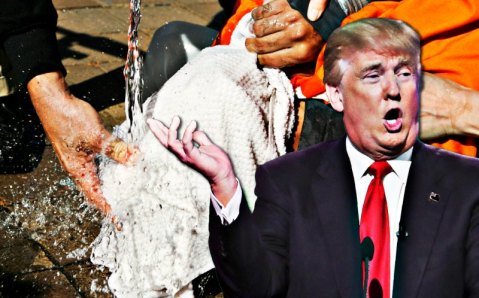
A little more than two weeks into the presidency of Donald J. Trump, it is clear that his administration is shaping up to be one of the most hostile to international norms in recent memory. While George W. Bush once dismissed a reporter’s question about whether his Iraq policies conformed with international law by joking, “International law? I better call my lawyer,” Trump’s attitude toward rule of law principles was summed up by a tweet today disparaging a “so-called judge” who put a nationwide hold on the implementation of his travel ban on nationals of seven majority-Muslim countries.
“The opinion of this so-called judge, which essentially takes law-enforcement away from our country, is ridiculous and will be overturned!” Trump tweeted.
The travel ban has sparked a national and international outcry, with demonstrations taking place at airports across the country and numerous world leaders weighing in on Trump’s controversial executive order to halt entries into the United States by citizens of Iraq, Iran, Libya, Somalia, Sudan, Syria, and Yemen.
“Discrimination on nationality alone is forbidden under human rights law,” said UN High Commissioner for Human Rights Zeid Raad Al Hussein. “The U.S. ban is also mean-spirited, and wastes resources needed for proper counter-terrorism.”
German Chancellor Angela Merkel expressed regret over the U.S. government’s entry ban and explained the U.S.’s international obligations under the 1951 Refugee Convention in a phone call with Trump, Merkel’s spokesman Steffen Seibert said in a statement.
“The Refugee Convention requires the international community to take in war refugees on humanitarian grounds. All signatory states are obligated to do. The German government explained this policy in their call yesterday,” Seibert said.
The OSCE Parliamentary Assembly’s human rights and humanitarian committee chair Ignacio Sanchez Amor expressed concerns that the ban on refugees represents a major step backward in the international community’s efforts to develop a cohesive response to the refugee and migrant crisis, and noted that on humanitarian grounds the United States cannot send refugees back to countries where they face serious threats to their life or freedom.
“This is the core principle of non-refoulement that is at the heart of the 1951 Refugee Convention, and is now a widely accepted norm,” he said.
Sanchez Amor also pointed out that the travel ban is contrary to the spirit of the OSCE’s founding document, which the United States signed along with 34 other countries of North America, Europe and Eurasia in 1975.
“To the extent that this travel ban may affect those with dual nationalities or residents of OSCE countries, I note that it may contravene the 1975 Helsinki Final Act’s stipulation that signatories should ease regulations concerning movement of citizens within the OSCE area,” he said.
In this document, the United States agreed:
to facilitate wider travel by their citizens for personal or professional reasons and to this end they intend in particular:
– gradually to simplify and to administer flexibly the procedures for exit and entry;
– to ease regulations concerning movement of citizens from the other participating States in their territory, with due regard to security requirements.
In addition to whipping up a frenzy of international condemnation over the travel ban, the Trump administration is also drawing fire for his nominations to lead the nation’s intelligence services. Yet, despite serious concerns about Trump’s pick to lead the CIA, Mike Pompeo, for his pro-torture statements and lax attitude about the use of mass surveillance, the U.S. Senate confirmed him on Jan. 23 by a vote of 66-32.
“Pompeo’s responses to questions about torture and mass surveillance are dangerously ambiguous about whether he would endorse abusive practices and seek to subvert existing legal protections,” said Human Rights Watch’s Maria McFarland Sanchez-Moreno. “Pompeo’s failure to unequivocally disavow torture and mass surveillance, coupled with his record of advocacy for surveillance of Americans and past endorsement of the shuttered CIA torture program, make clear that he should not be running the CIA.”
Democratic Oregon Sen. Ron Wyden said Pompeo was the “wrong man for the job.”
“He has endorsed extreme policies that would fundamentally erode liberties and freedoms of our people without making us safer,” Wyden said. He said Pompeo’s answers to questions from some senators have been “vague” and “contradictory,” making it impossible to know what Pompeo believes.
Nevertheless, his nomination sailed through the Senate, likely paving the way for a return to torture as U.S. policy, as President Trump has promised to do on numerous occasions. The president recently even defended torture on national television, stating unequivocally that it “works.”
Shortly following Pompeo’s confirmation, his deputy director at the CIA was named as Gina Haspel, who, according to the New York Times “played a direct role in the CIA’s ‘extraordinary rendition program,’ under which captured militants were handed to foreign governments and held at secret facilities, where they were tortured by agency personnel.”
She also ran the CIA’s first black site prison in Thailand and oversaw the brutal interrogations of two detainees, Abu Zubaydah and Abd al-Rahim al-Nashiri.
In addition, she played a vital role in the destruction of interrogation videotapes that showed the torture of detainees both at the black site she ran and other secret agency locations. As The Intercept’s Glenn Greenwald explains:
The concealment of those interrogation tapes, which violated both multiple court orders as well the demands of the 9/11 Commission and the advice of White House lawyers, was condemned as “obstruction” by Commission Chairs Lee Hamilton and Thomas Keane. A special prosecutor and Grand Jury investigated those actions but ultimately chose not to prosecute.
As if these developments were not bad enough, it also looks as if Trump is going to continue the reckless drone assassination program that was developed by his predecessor, Barack Obama. In one of his first military actions as president, Trump ordered an attack on a village in Yemen on Jan. 29 that killed as many as 23 civilians, including a newborn baby and an eight-year-old girl, Nawar al-Awlaki.

Nawar al-Awlaki, eight-year-old girl killed by U.S. drone on Jan. 29, 2017
Nawar was the daughter of the al-Qaida propagandist and American citizen Anwar al-Awlaki, who was killed in a September 2011 US drone strike in Yemen. Awlaki’s 16-year-old son Abdulrahman was killed in a second drone strike soon afterwards.
Following the tragic killing of this young girl, The Guardian pointed out that Trump has previously endorsed killing relatives of terrorist suspects, which is a war crime. “The other thing with the terrorists is you have to take out their families, when you get these terrorists, you have to take out their families,” he told Fox News in December 2015.
The human rights organization Reprieve pointed out:
Secret US strikes, in countries where the US is not at war, are widely considered to violate international law. Previous research by Reprieve has found that, in attempts to kill 41 named individuals in Yemen and Pakistan, US strikes killed some 1,147 unknown men, women and children.
It looks as though this is one policy area that we should expect some continuity between Obama and Trump. It also looks as if Trump will be moving rapidly to reinstate the torture regime that was halted by Obama in 2009. It should be noted, however, that the use of torture – although illegal – was never prosecuted by the Obama administration, and this lack of law enforcement ensured that it would remain a “policy option” for a fascist president like Donald Trump to pull off the shelf.
Trump takes office in violation of anti-corruption norms
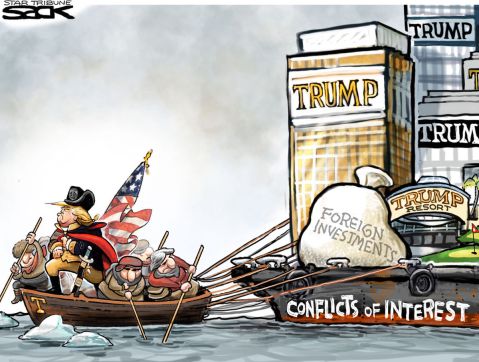
There are many things unprecedented about the incoming Trump presidency, not the least of which being the fact that the United States has never before been led by a billionaire with business interests spanning the globe. Only time will tell how Donald Trump ultimately ends up balancing his global business empire with running the U.S. government – but so far it is not looking promising.
In fact, as Richard Painter, former ethics lawyer in the George W. Bush administration, has pointed out, he may be in violation of the U.S. Constitution’s emoluments clause on day one of his presidency. This clause is one of the most critical conflict of interest provisions for all U.S. government officials. Basically, it is intended to ensure that nobody holding a position of trust with the United States government can receive payments from foreign governments, whether gifts or a salary or profits.
As Painter explained recently on Democracy Now:
If you have somebody who’s making profits from dealing with foreign governments or companies controlled by foreign governments, that person must dispense with those profits, cannot receive that money, while holding any position of trust with the United States government. That applies to every U.S. government employee, including the president. And so, what this means is that, for Donald Trump, if he’s going to hold onto these business enterprises, which present a whole range of other conflict of interest problems, to satisfy the Constitution, at a bare minimum, what he’s going to have to do is get the foreign government money and money from foreign government-controlled corporations out of his business enterprise. And this includes foreign diplomats staying at the hotels at government expense, foreign governments having big parties in his hotels and canceling reservations at the Four Seasons, going over to the Trump Hotel, to curry favor. All of that is unconstitutional.
Trump has responded to these criticisms by assuring the public that he would donate hotel profits from foreign governments to the United States Treasury and let his children manage all operations. This however isn’t enough to keep him on the right side of the Constitution, as law professor Erwin Chemerinsky explains:
In a word, Trump’s proposed solutions are laughable. So what if he donates “profits” from foreign governments to the United States Treasury? All he has to do is accept money from a foreign government and he’s already in violation of the emoluments clause – it doesn’t matter whether it constitutes a profit, or where the money ultimately ends up.
Focusing on profits, moreover, ignores the countless ways that his businesses can benefit from foreign governments that would never show up on a balance sheet. For example, it was widely reported that Trump lobbied a British political ally to oppose a wind farm project because it might ruin the view from his golf course in Aberdeen, Scotland.
Besides, Trump on Wednesday again refused to reveal his tax returns and declared that the American people do not care about them. A pledge to turn over profits is meaningless without detailed accounting.
While his global business holdings may render his conduct as president unconstitutional, his incoming administration’s nepotism and conflicts of interests also pose serious challenges to international norms, and may render the United States in violation of the United Nations Convention against Corruption. As a state party to this convention, the United States has agreed to prevent conflicts of interest and corruption – including through “revolving-door practices,” such as placing corporate chieftains in charge of government regulatory agencies.
In particular, according to the convention:
Each State Party shall, in accordance with the fundamental principles of its domestic law, endeavour to adopt, maintain and strengthen systems that promote transparency and prevent conflicts of interest.
Each State Party shall endeavour, where appropriate and in accordance with the fundamental principles of its domestic law, to establish measures and systems requiring public officials to make declarations to appropriate authorities regarding, inter alia, their outside activities, employment, investments, assets and substantial gifts or benefits from which a conflict of interest may result with respect to their functions as public officials. …
Preventing conflicts of interest by imposing restrictions, as appropriate and for a reasonable period of time, on the professional activities of former public officials or on the employment of public officials by the private sector after their resignation or retirement, where such activities or employment relate directly to the functions held or supervised by those public officials during their tenure.
The United States has long flouted these international obligations by allowing the corporate-government revolving door to swing freely and lucratively, but the violations of international norms will likely reach extraordinary new levels under Trump.
The advocacy group Transparency International, for one, is raising concerns that the practices that Trump is pursuing are exactly what “leaders in highly corrupt countries do.” As the organization recently tweeted out, “#Trump appointing his son-in-law as senior adviser looks a lot like #NEPOTISM to us!”
The group produced a video driving the point home in dramatic fashion:
Another Transparency International video outlines the conflicts of interest of his top cabinet picks and the likely corruption that will ensue:
While there is nothing new about conflicts of interest and corruption in the U.S. government (as reported by Compliance Campaign among others for years) the graft will likely dramatically worsen under Trump. In the past, the corruption has always been obscured by a veneer of legitimacy that masks the profiteering by the oligarchy running the government, but that mask is about to be removed.
But with the sleaze, fraud and vice about to be unleashed on the world, the United States may become more internationally isolated, possibly hastening the end of U.S. hegemony around the world. This might not ultimately be such a bad thing, as opening the global system to a more multilateral balance of power could end up being a net positive for the world, and U.S. isolation could help bring this about.


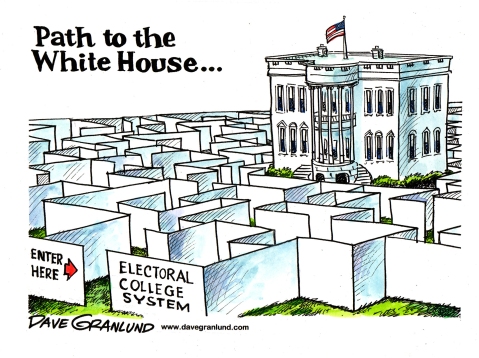
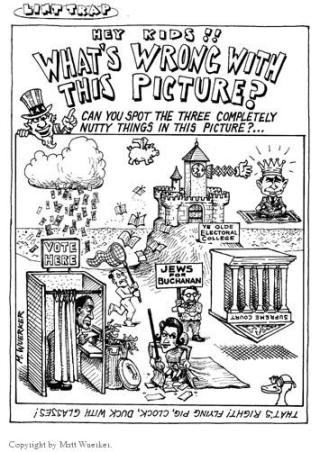 Now, for the second time in the young 21st century, the popular vote loser is
Now, for the second time in the young 21st century, the popular vote loser is 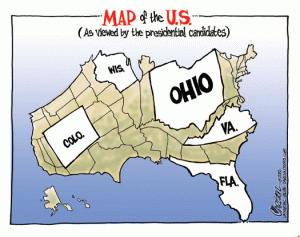 In the ICCPR, for example, the signatories
In the ICCPR, for example, the signatories 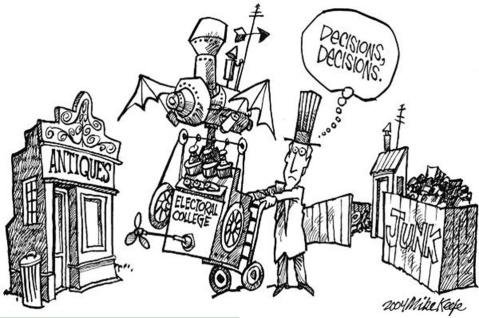
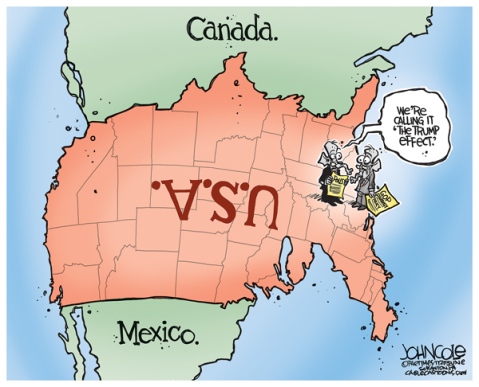


 Super Tuesday is afoot, with 661 delegates at stake in the Republican primary and 865 delegates for the Democrats. This means that a presidential candidate who does well could shift the momentum and change the media narrative in a way that fundamentally alters the course of Election 2016. Or not.
Super Tuesday is afoot, with 661 delegates at stake in the Republican primary and 865 delegates for the Democrats. This means that a presidential candidate who does well could shift the momentum and change the media narrative in a way that fundamentally alters the course of Election 2016. Or not.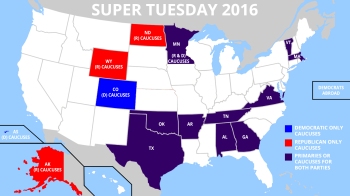 The big day, which could make or break several candidates on the Democratic and Republican sides (those who haven’t already dropped out after disappointing showings in earlier primary states), underscores the largely arbitrary and chaotic nature of United States primary elections, which are something of an oddity in advanced democracies.
The big day, which could make or break several candidates on the Democratic and Republican sides (those who haven’t already dropped out after disappointing showings in earlier primary states), underscores the largely arbitrary and chaotic nature of United States primary elections, which are something of an oddity in advanced democracies.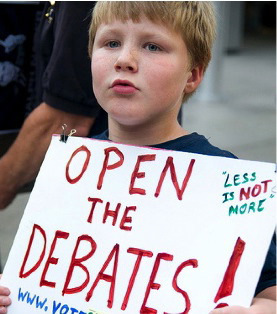 In the United States, which uses a strict and archaic winner-take-all system and erects severe obstacles to independent parties (including such challenges as stringent ballot access rules that
In the United States, which uses a strict and archaic winner-take-all system and erects severe obstacles to independent parties (including such challenges as stringent ballot access rules that 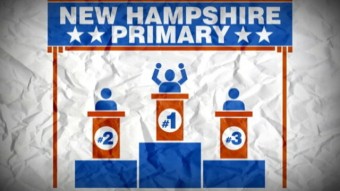 Because so much disproportionate weight is given to the states holding early primaries, including New Hampshire and Iowa, and because states holding primaries later – such as California – often don’t even get to vote for the same candidates (many of whom will have already dropped out by that time), the system is fundamentally flawed and effectively disenfranchises millions of would-be primary voters. (For example, New York, the third-largest state, voted after the nominees had been selected in both parties in 2000 and 2004.)
Because so much disproportionate weight is given to the states holding early primaries, including New Hampshire and Iowa, and because states holding primaries later – such as California – often don’t even get to vote for the same candidates (many of whom will have already dropped out by that time), the system is fundamentally flawed and effectively disenfranchises millions of would-be primary voters. (For example, New York, the third-largest state, voted after the nominees had been selected in both parties in 2000 and 2004.)